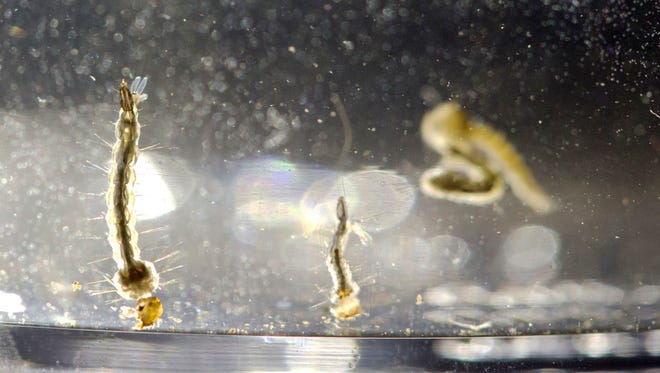Federal prisons not testing all inmates for Zika
WASHINGTON — Federal prison authorities are not testing all arriving inmates for the Zika virus, including hundreds who are regularly shuttled into the U.S. from Puerto Rico, where thousands have been infected, according to Federal Bureau of Prisons documents and staffers.

While federal officials said high-risk, pregnant inmates are tested if they have histories of potential exposure, other arriving inmates in Puerto Rico and Florida are not routinely tested. The bureau recently authorized the purchase of repellent for distribution to staffers who work outside and for some inmates assigned to outside details, yet other inmates must purchase their own supplies from prison commissaries.
The conditions have raised serious concerns among some prison workers, especially in Florida, citing the risk posed by the continued transfer of untested inmates from the prison bureau's detention center in Guaynabo, Puerto Rico. Meanwhile, Rep. David Jolly, R-Fla., who has pressed the Centers for Disease Control to provide the state with additional Zika protection funding, described the continued transfer of untested inmates as "a real threat.''
"The current BOP clinical guidance fails to adequately address detection and prevention of Zika among the general prison populations,'' Jolly said in a letter earlier this week to Thomas Kane, the prison bureau's acting director. "It is imperative that the BOP assess all prison populations in areas where there is local transmission of the Zika virus and notify its prisons of any positive cases before transferring prisoners to a new facility.
Fla. finds Zika virus in U.S. mosquito for first time
Rep. Carlos Curbelo, R-Fla., also has raised questions, saying in August that none of the 550 inmates who had been transferred to Miami's Federal Correctional Institute had been tested.
"It's necessary that when these prisoners are transferred to FCI Miami or any other prison, that they be screened for Zika in order to ensure the safety of the guards and other prisoners,'' Curbelo said.
According to CDC data compiled earlier this week, there have been more than 25,000 Zika cases reported in Puerto Rico, with all but 75 acquired locally. In the U.S., meanwhile, there have been 3,936 cases. At least 3,800 were associated with travel in known Zika risk zones, while 128 were acquired in Florida. (Justin Long, a spokesman with the prison bureau, said the agency does not track the number of pregnant inmates screened for Zika symptoms, but none that have been screened have tested positive for the virus.)
The large number of travel-related cases in the U.S., Jolly and others said, highlight the potential risk posed by inmates who are shuttled to the U.S. mainland from Puerto Rico. The prison bureau was unable to immediately provide the number of such movements each month. But Jorge Fermin, a corrections officer at the Guaynabo detention center and local president of the prison workers' union, said that up to 240 inmates each month are moved from the Puerto Rico facility to the U.S., for various reasons.
New Zika transmission zone identified in Miami area
"We are at ground zero here,'' Fermin said, referring to the Zika threat in Puerto Rico. "We worry that they (the inmates) might be carrying the virus even though they are not showing the symptoms. Everybody's concern here is that every inmate taken in should be tested. But they (prison officials) won't do it, unless the CDC mandates it.''
The bureau has issued a number of Zika-related memos in the past year, each urging staffers to follow the CDC's latest guidance, especially as it relates to pregnant inmates. In August, prison officials announced provisions for the purchase of mosquito repellent to be distributed to staff and some inmates in high risk zones. The most recent directive, issued Sept. 6, singled out Guaynabo inmates for additional attention in advance of their transfer from the facility to the U.S. mainland.
Short of actual testing, BOP Medical Director Jeffery Allen "recommended'' that departing inmates apply repellent and continue the applications daily for at least three weeks after their transfers to guard against transmission.
"Prior to departing Guaynabo, it is recommended that all inmates be provided the opportunity to self-apply mosquito repellent to exposed skin surfaces to to the potential for mosquito exposure during transport,'' Allen wrote in last month's Zika update.
Eric Young, national president of the federal prison employees union known as the Council of Prison Locals, said Zika has been "very much a concern for me,'' adding that the union lobbied hard for the acquisition of repellent, especially for staffers.
Within "weeks'' of raising the issue, Young said prison officials committed to authorizing the purchase and distribution of repellent.
"It was the best I was able to do,'' Young said.
But other staffers and lawmakers do not believe the risk has been adequately allayed.
Joe Rojas, local president of union staffers at Florida's Coleman Federal Correctional Complex near Orlando, said he and others have lodged complaints with the Occupational Safety and Health Administration, alleging the transfers represent a health hazard.
"Employees are at risk for occupationally acquired Zika virus infection from mosquito bites or contraband sharps (knives and shanks) contaminated by body fluids of infected individuals,'' according to one complaint.
"The fact that not everyone is screened is really a public safety issue,'' Rojas said.